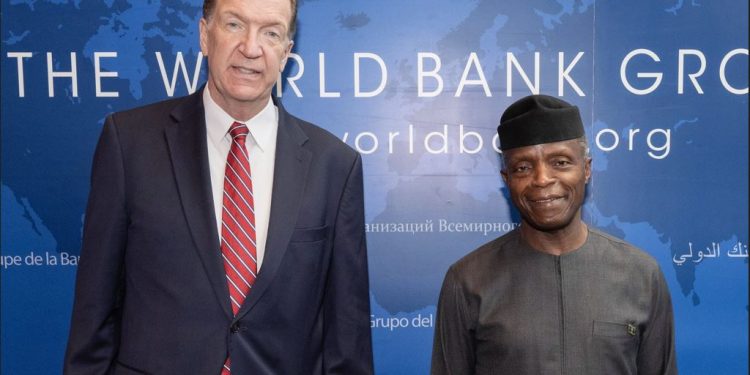The President of the World Bank, David Malpass, has revealed that the bank is prepared to assist Nigeria in Getting Rid of the ongoing regressive fuel subsidy regime in the country.
This was disclosed in a meeting the World Bank Group President had with the Vice President of the Federal Republic of Nigeria, Yemi Osinbajo.
The World Bank is a major proponent of the removal of fuel subsidies in Nigeria. The international financial organization believes that putting an end to subsidy expenditure will increase social assistance for the poor and vulnerable in Nigeria.
In the Nigeria Development Update (NDU) released in July 202 by the WBG, it revealed that fuel subsidies in Nigeria favored the rich more than the poor and that Nigeria will be able to uplift a lot of people out of poverty if it diverts the huge fiscal savings it will realize from subsidy removal to pro-poor investment in health, education.
President Malpass, after assuring Vice President Osinbajo of the WBG’s readiness to support Nigeria in phasing out regressive fuel subsidies, made remarks on Nigeria’s Energy Transition Plan and gave some macroeconomic perspective on the Nigerian economy. He emphasized the need for a favorable policy and regulation landscape amid strengthened institutions in the energy sector, as well as the importance of integrating climate and development. He also complimented Nigeria’s dedication to achieving universal energy access and reducing greenhouse emissions.
In the meeting with Yemi Osinbajo, the World Bank President highlighted the need for Nigeria to take a decisive step towards the unification and stabilization of Nigeria’s exchange rate. He stated that “a unified exchange rate will significantly improve the business enabling environment in Nigeria, attract foreign direct investment, and reduce inflation.”
Additionally, Malpass and Osinbajo discussed the need to increase the domestic revenue of Nigeria by broadening Nigeria’s tax base accompanied by an efficient tax administration.
What you should know
- Nigeria’s Finance Minister, Zainab Ahmed, while appearing before the House of Representatives Committee on Finance, to defend the 2023-2025 Medium Term Expenditure Framework (MTEF) and Fiscal Strategy Paper (FSP), disclosed that the government’s budget deficit was expected to exceed N12.42 trillion if petroleum subsidies were maintained for the entire 2023 fiscal cycle.
- The current economic outlook of Nigeria suggests that harsher fiscal times may come in 2023 if fuel subsidies are retained.
- Nigeria is working on achieving net-zero emission of greenhouse gas by 2060, a move it aims to use in tackling climate change and increasing energy access in the country.
- Nigeria’s Vice President, Yemi Osinbajo, is also working on securing a debt-for-climate swap agreement with some of Nigeria’s creditors, to help relieve up to about $100.06 billion in external debt while advancing the climate change objective of Nigeria as well as the broader international community.










